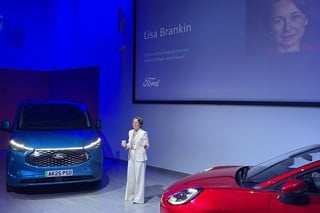As a major shortage of specialist maintenance technicians puts the take-off of the EV market at risk Sarah Sillars OBE argues that more urgency in the government’s response is part of the solution.
Hardly a day goes past without the national media covering the growth of the electric vehicle (EV) market whether it’s the new Honda/Sony partnership, Ford’s latest ambitious plans or the debate on investing in battery swapping or charging stations.
As equally important, if less eye-catching, is the question of who is going to fix these vehicles when they break down or require maintenance.
In the UK, according to the Institute of the Motor Industry (IMI), only 6% of the current 250,000 technicians in the automotive sector are EV qualified.
But the country needs 90,000 qualified by 2030, when no more new petrol and diesel vehicles will be allowed on the country’s roads.
In fact, the need to act quickly is already here when you consider the findings of February’s ‘Which? Car Guide’ survey of 48,000 owners including over 2,000 EV owners, which identified that EV cars spend the longest time off the road to get repaired – just over five days compared with an average of 3.5 days.
Tackling the shortage
There are three main ways to tackle this acute skills shortage.
One is commercial training where vehicle manufacturers, dealers and garages can either train EV technicians in-house or outsource the training-to-training providers and colleges.
An alternative is to run apprenticeship programmes to official standards with government funding support, but both options currently face major challenges.
On the commercial side, the motor industry remains largely unregulated so that anyone can set up in business to repair and service motor vehicles and since 2018, the IMI has been warning government that untrained ‘have-a-go’ individuals have been putting their lives at risk by attempting repairs to EV and hybrid vehicles.
In particular, the Institute has been lobbying for a better regulatory framework because the Electricity at Work Regulations (EWR) 1989 are not fit for purpose when applied to EVs.
In the absence of a government mandated standard for competence in EV maintenance, the industry is lacking commercially trained technicians with the appropriate level of qualifications and accreditation.
Lack of urgency
Because government funding supports the training and assessment of apprentice technicians, one would hope that the quest for assuring EV competence would be more advanced when it comes to apprenticeships.
But unfortunately, we are also seeing a real lack of urgency on the part of the regulators in the introduction of apprenticeship standards which are much more tailored for EV technicians. The need for such new standards is especially evident in the heavy vehicle market.
This prompts the question of whether the regulators are aware of the full implications of the 2030 ban on new petrol and diesel vehicles.
Vehicle manufacturers certainly are which means that they are forced to look at commercial training options when often they would prefer their young recruits to gain the necessary knowledge, skills and behaviours within a ‘gold standard’ apprenticeship programme.
My industry colleagues at Remit Training are among those providers who report that their automotive academies are extremely busy training to reduce the EV skills gap for cars, vans and trucks. Global brands who also invest in in-house training are calling them for additional support.
As champions of the programme, Remit would normally recommend apprenticeships to their clients and the provider trains nearly 2,000 apprentices, but government inaction on making the apprenticeship offer appropriate for the growing EV market means that they welcome commercial training inquiries as well.
Driving diversity
In addition to commercial and apprenticeship training, a third way of addressing the technician shortage is for the sector’s workforce to become more diverse.
We are slowly seeing more women and young people from ethnic minority backgrounds learning in automotive academies and on the need to recruit more young people with disabilities and non-visible disabilities, I have been chairing a working group for an IMI Task Force which is shortly publishing a diversity report making a series of key recommendations.
Following the publication of a skills white paper last year, the government wants employers to know that it is on top of anticipating demand for specialist skills with the setting up of a ‘future skills’ forecasting unit within Whitehall and the introduction of employer-led Local Skills Improvement Plans around the country. And to be fair, it anticipates increased demand for green apprenticeships.
The problem is that the slowness of the process and the lack of official action in response results in too much industry reliance on unregulated commercial EV technician training.
In terms of fleets being kept safely on the road, this generates considerable risk when Britain has to be supplied with the goods and food it needs.
Ministers should act now on having the right type of apprenticeships in place.
Author: Sarah Sillars OBE, is IMI vice president, chairperson of the IMI's Disability & Non-Visible Disability Task Force and a Citygate Automotive non-executive director



















Login to comment
Comments
No comments have been made yet.